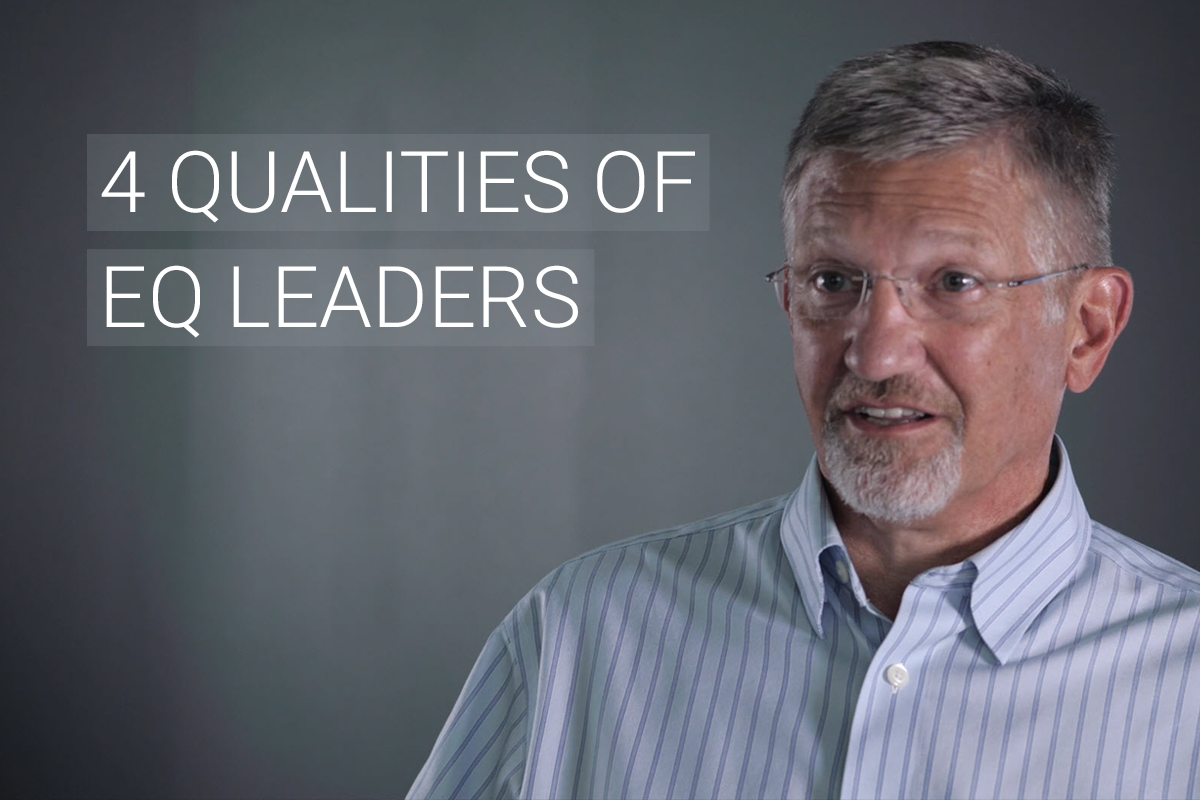If I told you there was a way to increase your organization's productivity by one third, would I have your attention? Or if you could exceed your revenue targets by 20% in the coming year, would you listen? Personally, if I told you that you could increase your salary by an average of $29,000 per year, would that be of interest to you?
Turns out each of these targets can be achieved through emotional intelligence. Emotionally intelligent leadership demonstrates the following things: stronger leadership, increased team performance, improved decision making, decreased occupational stress, reduced staff turnover, and an overall sense of personal well-being. Here are four qualities of emotionally intelligent leaders.
1. Self-Awareness
By slowing down, humbly looking at myself and others around me, and learning to listen to the feedback I get, I become more self-aware as a leader and of my emotions that are involved in my leadership. Simply taking five minutes every day to write down my thoughts and emotions is a great step towards self-awareness.
Another important step is asking for candid feedback from those around me. It's a bold step, but it is an important opportunity to learn more about myself.
2. Self-Management
Once I have a clear view of my emotions and style, I can then begin to practice self-management. Self-management is important because it makes me predictable to those around me, and they will know what to expect in our relationship.
One of the key aspects of self-management is learning to manage conflicts. I like the old rule that says, when there's a conflict, slow down. Try to see the person in-person. If they are not available, make a phone call. If you can’t make that phone call, write an email, but do not send it for 24 hours.
3. Empathy
Empathy for the people around me is important as a leader. Empathy is different than sympathy. Sympathy is about how I feel. Empathy is about your experience, what you are feeling, and how I join that experience.
4. Social Skills
Finally, if you're a leader, you're an influencer. Influencing others is based on social skills. The key element to those social skills is being present with the other person or team when you are with them. That means avoiding distractions and being focused on them, listening to them, and joining their experience.
Emotionally intelligent leaders foster an environment of trust and affirmation. They know how to manage conflict well, they create strong teams, they build new leaders, and most of all, they are fun to be around.
So, are you an emotionally intelligent leader?
We would love to hear the ways that you are building trust, affirming your team, and practicing emotional intelligence.
Contact us for more information on how our coaches can help to increase your leadership effectiveness.
Paul Keisling is a Senior Consultant at The Center Consulting Group and has over 40 years’ experience in building, leading and operating organizations. He enjoys coaching and developing leaders at all levels of organizations. He is particularly interested in supporting organizations and leaders in times of crisis, transition and through the strategic planning process. Paul has served on a number of nonprofit boards and was a founding board member of Chariots for Hope - an organization that oversees Children's Homes across the country of Kenya. He holds a BA in Behavioral Science from Messiah College, a Master of Social Work from Temple University, studied theology and counseling at Westminster Seminary, and is a Certified Psychiatric Rehabilitation Practitioner. He is a frequent presenter on mental health topics, program development and Servant Leadership.





![Leadership: How to Be a World Class Boss [VIDEO]](https://images.squarespace-cdn.com/content/v1/571fc0ea1d07c0fd6d72c167/1744640489138-X5LUNZT3JTRQYSSZXV1C/boss+thumbnail.png)
![Conflict: The Importance of Having Tough Conversations [VIDEO]](https://images.squarespace-cdn.com/content/v1/571fc0ea1d07c0fd6d72c167/1741365599296-KTWEJ5PTNH1BX2GJ9REJ/Conversations+blog.png)
![Exit Planning: The Challenge of Business Exit Planning & Why It Matters to You [VIDEO]](https://images.squarespace-cdn.com/content/v1/571fc0ea1d07c0fd6d72c167/1738339040891-VIW87N2NCZUCKLYNOHB6/exit+blog.png)

![Teams: Is Your Team Dysfunctional? [VIDEO]](https://images.squarespace-cdn.com/content/v1/571fc0ea1d07c0fd6d72c167/1733243870005-NOI69Z74DLNVLIB8MRRJ/dysfunctional+blog.png)
![How to Recruit and Inspire Volunteers [VIDEO]](https://images.squarespace-cdn.com/content/v1/571fc0ea1d07c0fd6d72c167/1728421227208-6JAUFVXEJW5KK6YE58JR/volunteers+blog.png)
![Trust: 4 Steps to Rebuild Damaged Trust [VIDEO]](https://images.squarespace-cdn.com/content/v1/571fc0ea1d07c0fd6d72c167/1725969594417-7AN9PJO2X8TTR77ACDFP/trust+blog.png)
![Blind Spots: How to Identify & Avoid Blind Spots in Your Organization [VIDEO]](https://images.squarespace-cdn.com/content/v1/571fc0ea1d07c0fd6d72c167/1722610352594-FAXECLPC61QYJH2I5YT8/blind+spot+blog.png)
![Family Business: Will the Family Business Destroy Our Family? [VIDEO]](https://images.squarespace-cdn.com/content/v1/571fc0ea1d07c0fd6d72c167/1718027719043-MU9AYPTQ7GM4XWT9EGD1/destroy+blog.png)
![Teams: How to Breathe New Life into a Broken Team [VIDEO]](https://images.squarespace-cdn.com/content/v1/571fc0ea1d07c0fd6d72c167/1714749389916-G2CWVK8OM1JJSD9058CL/breathe+blog.png)
![Planning: The Power of Planning [VIDEO]](https://images.squarespace-cdn.com/content/v1/571fc0ea1d07c0fd6d72c167/1712597764732-WHRZPRLZ6V78CBGKBPZA/PLanning+blog.png)
![Leveling Up Your Leadership: Becoming an Effective Senior Leader [VIDEO]](https://images.squarespace-cdn.com/content/v1/571fc0ea1d07c0fd6d72c167/1710266273593-QN3HEBJ5FII4GKQFH91Q/leveling+up+blog.png)
![Recruiting & Retaining “Mature” Team Members [VIDEO]](https://images.squarespace-cdn.com/content/v1/571fc0ea1d07c0fd6d72c167/1707849950823-Y5WJLYXM6ZPU55TKG27Y/recruitment+blog.png)

![Gaslighting: How to Identify It & Take Back Control [VIDEO]](https://images.squarespace-cdn.com/content/v1/571fc0ea1d07c0fd6d72c167/1699381799669-Y6XNYG2X3ZD1US80XAFY/Gaslighting+blog.png)
![Decision-Making: Why Smart Leaders Do Dumb Things [VIDEO]](https://images.squarespace-cdn.com/content/v1/571fc0ea1d07c0fd6d72c167/1696947285846-ZIA5M26B5AF9SRFGWFPV/Dumb+Things+blog.png)

![Meeting Effectiveness: 4 Different Types of Meetings & Why It Matters [VIDEO]](https://images.squarespace-cdn.com/content/v1/571fc0ea1d07c0fd6d72c167/1690296011536-23CWWE2VJ40QJ0UA1EZY/meetings+blog.png)
![Leadership: 4 Directions You Need to Lead [VIDEO]](https://images.squarespace-cdn.com/content/v1/571fc0ea1d07c0fd6d72c167/1689105063370-WQTIN47T3TP8YXQM3RMP/directions+blog.png)
![Leadership Model: Are You a Cheerleader, Drill Sergeant, or Coach? [VIDEO]](https://images.squarespace-cdn.com/content/v1/571fc0ea1d07c0fd6d72c167/1686670057921-DJ286QE8OZOQKE22SZAL/coach+blog.png)
![Developing Women Leaders: The Power of Leader Efficacy [VIDEO]](https://images.squarespace-cdn.com/content/v1/571fc0ea1d07c0fd6d72c167/1683572272369-EJ4N7BBXL0832YUM4XUN/Women+efficacy+blog.png)


![Innovation: How To Make Innovation Part of Your Leadership [VIDEO]](https://images.squarespace-cdn.com/content/v1/571fc0ea1d07c0fd6d72c167/1675365017628-0ZAPR2WCAM23JVDHM34I/Innovation+blog.png)
![Civil Discourse Part 2: 3 Cognitive Skills to Help You Understand Different Perspectives [VIDEO]](https://images.squarespace-cdn.com/content/v1/571fc0ea1d07c0fd6d72c167/1673898642478-RKKE5JM6YMMKG460MCOD/Civil+Discourse+Cognitive+Skills+blog.png)
![Civil Discourse Part 1: 3 Emotional Skills to Engage With Those You May Not Agree With [VIDEO]](https://images.squarespace-cdn.com/content/v1/571fc0ea1d07c0fd6d72c167/1667851162605-2PANA7ZP4DAWH0WI7V3B/Civil+Discourse+Emotional+Skills+blog.png)
![Coaching: Leadership Coaching for High Performance [VIDEO]](https://images.squarespace-cdn.com/content/v1/571fc0ea1d07c0fd6d72c167/1665424350332-LKS9SEVB9T8ZPOOMVSAT/Coaching+blog.png)
![Family Legacies in the Workplace [VIDEO]](https://images.squarespace-cdn.com/content/v1/571fc0ea1d07c0fd6d72c167/1663246593252-EGUEIAVMWS491D6F9GK8/Family+Legacies+blog.png)

